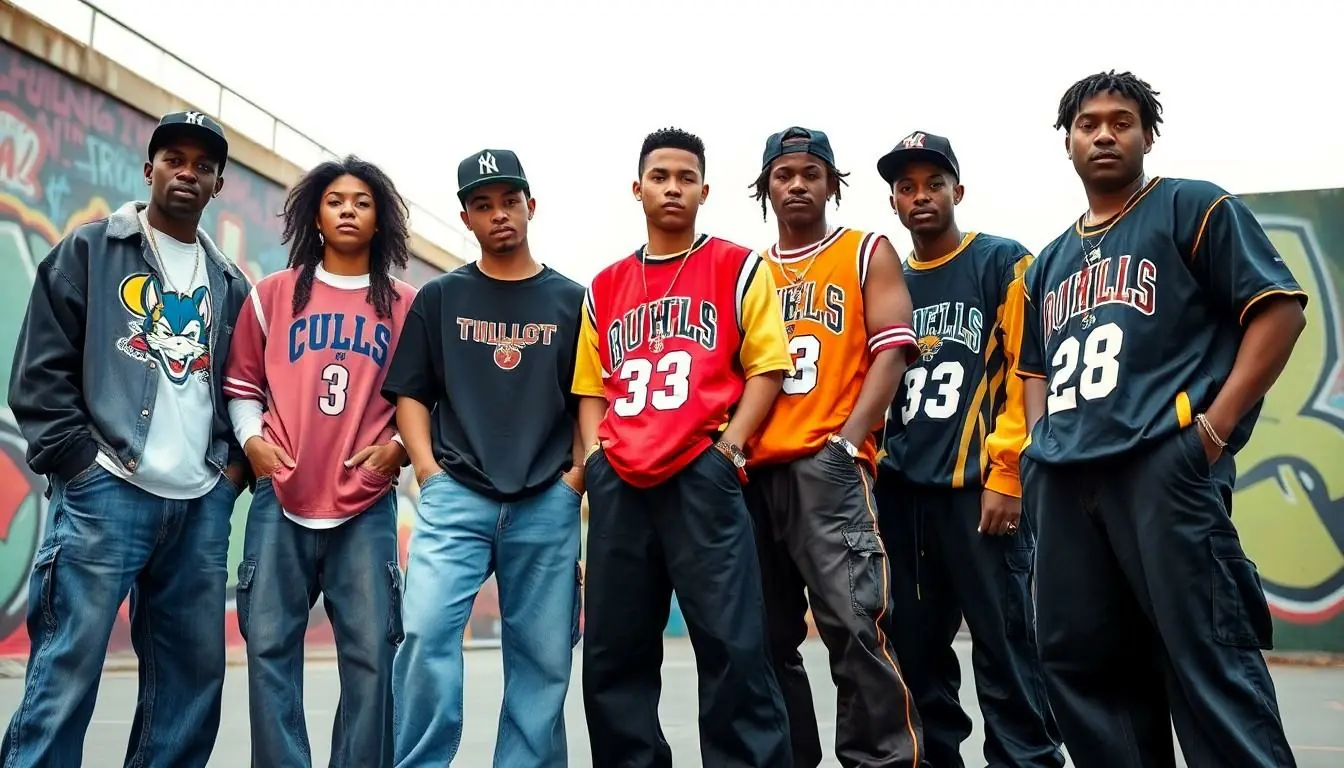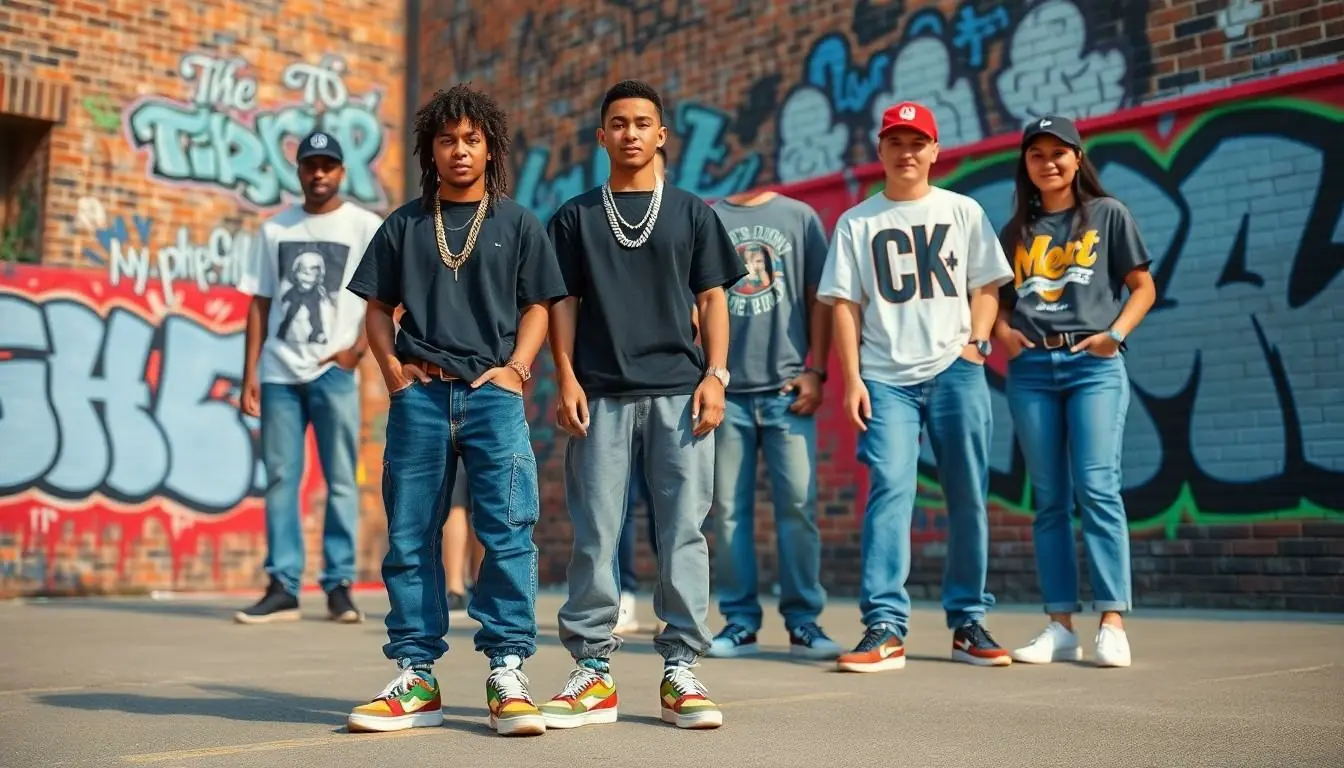Step back in time to the 2000s, when hip hop wasn’t just a genre—it was a lifestyle. Baggy jeans, oversized tees, and bling that could blind the sun defined an era that celebrated individuality and bold expression. Fashion statements were made on the streets and in music videos, turning everyday wear into a canvas for creativity.
Table of Contents
ToggleOverview of 2000s Fashion, Hip Hop
2000s fashion, particularly within hip hop culture, showcased a unique blend of styles that emphasized personal expression. Baggy jeans emerged as a staple item, often paired with oversized tees that prioritized comfort and movement. Flashy accessories played a crucial role, featuring oversized chains, baseball caps, and colorful sneakers that made bold statements.
Celebrities and artists heavily influenced trends during this period. Rappers like Jay-Z and Ludacris popularized athleisure, incorporating tracksuits and sporty apparel into their everyday looks. Women’s fashion also evolved, with artists like Missy Elliott embracing vibrant colors and playful designs that challenged traditional femininity.
Streetwear labels gained traction, merging hip hop with fashion in innovative ways. Brands like Rocawear and FUBU not only represented the culture but also served as symbols of authenticity. Graphic tees and distressed denim further defined this era, reflecting a laid-back yet stylish vibe.
In addition to clothing, hairstyles became a significant aspect of hip hop fashion. Cornrows, braids, and fades were prevalent among both men and women, adding unique flair to individual identities. Makeup trends emphasized bold eye shadows and glossy lip colors, complementing the overall aesthetic of hip hop fashion.
Overall, the 2000s represented a transformative decade for fashion within hip hop culture, blending influences from music, art, and street style. This era paved the way for the diverse fashion landscape observed in hip hop today, solidifying its impact on global trends.
Iconic Trends of the 2000s

The 2000s brought memorable fashion trends that defined hip hop culture. Styles during this era reflected individuality and a unique blend of comfort and flair.
Baggy Jeans and Oversized Tees
Baggy jeans became a staple in hip hop wardrobes, offering both style and comfort. Figures like Ludacris and 50 Cent popularized these relaxed fits, emphasizing an easy-going look. Oversized tees complemented the baggy jeans, allowing for freedom of movement. Colorful graphics and bold logos often adorned these shirts, showcasing personal style. This combination of laid-back clothing served as a canvas for self-expression, making it iconic in the hip hop scene.
Jerseys and Athleisure Wear
Jerseys emerged as a fashionable choice, displaying favorite teams and players. Artists such as Jay-Z frequently wore basketball jerseys as a statement piece, blending sports with street style. Athleisure wear, which included tracksuits and sporty separates, gained momentum during this time. This trend, valued for its versatility, provided comfort while maintaining a sharp look. Enhanced materials and innovative designs became popular, merging athletic functionality with fashion-forward appeal.
Influential Figures in Hip Hop Fashion
The 2000s showcased key figures who significantly impacted hip hop fashion.
Artists Who Shaped the Trends
Jay-Z defined luxury streetwear by blending high fashion with urban style. Missy Elliott brought attention to avant-garde looks, using bold colors and unique silhouettes to make fashion statements. Artists like Ludacris popularized athleisure, promoting comfort while maintaining a stylish edge. 50 Cent’s G-Unit line emphasized the appeal of branded clothing within hip hop. Additionally, artists like Pharrell Williams influenced accessory trends, showcasing the importance of statement pieces in completing a look. Each of these figures contributed uniquely to trends that defined the era, influencing both music and fashion.
Designers and Brands in the Spotlight
Rocawear emerged as a leading brand representing hip hop culture. Founded by Jay-Z, it delivered a mix of casual and stylish garments. FUBU gained prominence by celebrating urban culture, promoting pride in African American heritage through its clothing. Phat Farm, created by Russell Simmons, fused hip hop with mainstream fashion, appealing to a wider audience. A Bathing Ape (BAPE) also became synonymous with hip hop, introducing streetwear aesthetics globally. Designers like Karl Lagerfeld collaborated with musicians, further blending fashion and music. These brands and designers played crucial roles in establishing a unique fashion identity for hip hop during the 2000s.
Cultural Impact of 2000s Hip Hop Fashion
The cultural influence of 2000s hip hop fashion reshaped clothing trends across the globe. Artists transformed the music industry, pushing fashion into the spotlight.
Influence on Mainstream Fashion
Hip hop fashion infiltrated mainstream culture, defining styles beyond the streets. Baggy jeans and oversized tees migrated from music videos to high street retailers. Celebrities emulated these trends through red carpet appearances, showcasing the genre’s aesthetic. Major brands adopted streetwear elements, resulting in collaborations between hip hop artists and fashion designers. Rocawear and FUBU set benchmarks for the era, demonstrating the blend of urban culture and fashion design. Retailers increased focus on athleisure, responding to the rise of comfortable, stylish clothing. This trend reflected a shift in consumer preferences, emphasizing individuality and self-expression in everyday wear.
Legacy in Modern Style
The legacy of 2000s hip hop fashion resonates in today’s style landscape. Current trends exhibit a revival of nostalgic elements such as baggy silhouettes and statement accessories. Many designers draw inspiration from this vibrant era, infusing collections with bold colors and textures. Streetwear brands continue to thrive, reflecting the influence of artists like Pharrell Williams and Kanye West. Modern celebrities often reference past styles, creating a cyclical connection between past and present. Consumers embrace the casual-meets-chic aesthetic, blending comfort with fashion-forward choices. Overall, the impact of hip hop fashion from the 2000s remains significant, shaping contemporary fashion narratives and inspiring future generations.
The 2000s marked a transformative period for hip hop fashion, leaving an indelible mark on style and culture. This decade celebrated bold expressions and individuality, with artists influencing trends that transcended music. The emergence of streetwear brands and the fusion of luxury with urban aesthetics reshaped how fashion is perceived today.
As nostalgia for this vibrant era resurfaces, the impact of 2000s hip hop fashion continues to inspire modern trends. The legacy of artists like Jay-Z and Missy Elliott lives on, reminding us of the power of self-expression in fashion. Today’s styles reflect this rich history, blending comfort with creativity, and ensuring that the spirit of 2000s hip hop remains alive and well in contemporary wardrobes.



